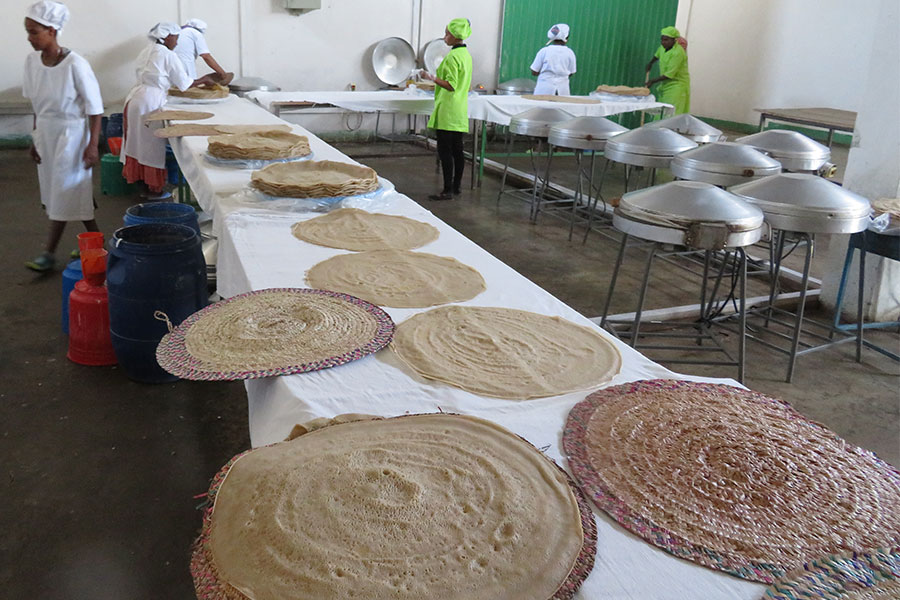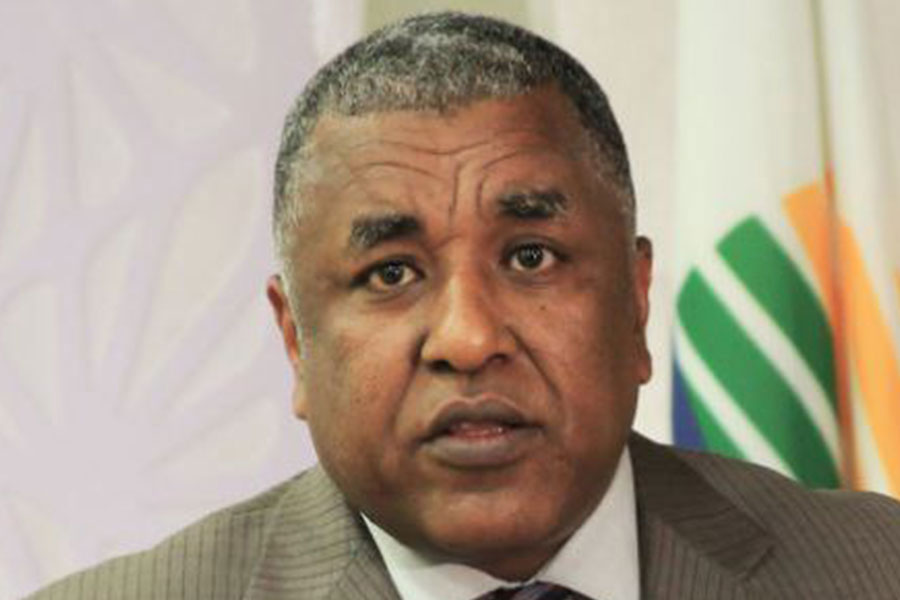
Fortune News | Apr 12,2020
Mar 18 , 2023
By Mariana Mazzucato , Ngozi Okonjo-Iweala and Johan Rockström
There still is a chance to convert the water crisis into a global opportunity for economy-wide progress and a new social contract with justice and equity at its centre. Failing that, there will no longer be a safe Earth system, warn Mariana Mazzucato, Ngozi Okonjo-Iweala, Johan Rockström, and Tharman Shanmugaratnam, in this commentary provided by Project Syndicate (PS).
The world’s water crisis can no longer be ignored. Unless we manage water properly, we will neither tackle climate change nor meet most of the Sustainable Development Goals (SDGs).
Last year’s unprecedented floods, droughts, cyclonic storms, and heat waves showed what is coming. But while such disasters garner plenty of attention, the underlying water crisis does not. Water-related challenges – whether there is too much, too little, or dirty and unsafe – are already fueling chronic food and health insecurity in entire regions. Every 80 seconds, a child under five dies from a disease caused by polluted water, and hundreds of millions more are growing up stunted and with diminished lifetime prospects.
Making matters worse, we have entered a vicious cycle in which the interaction of the water crisis, global warming, and the loss of biodiversity and natural capital exacerbate all three. Wetland erosion and lost soil moisture risk turning some of the planet’s great carbon stores into new sources of greenhouse-gas emissions, with devastating consequences for the climate.
No country can rely on its own territory for more than half the rainfall it receives. Everyone’s freshwater ultimately comes from precipitation, which depends on the presence of stable oceans, intact forests, and healthy ecosystems in other countries and regions. Yet land and ocean systems' capacity to generate water is destabilized.
As co-chairs of the Global Commission on the Economics of Water, we call for collective action to overcome the water crisis. We must marshal a response that is bolder, more integrated across sectors, more networked at the national and global levels, and more equitable than previous efforts. Our work shows that this will require a new “economics of water” and a comprehensive strategy to address key points.
We must recognize the global water cycle as a common good and manage it accordingly. Since everyone is ultimately connected through water, we must work together to break the vicious cycle and put water back on a sustainable trajectory. That will require a vision based on justice and equity for all communities everywhere.
We must adopt a mission-driven approach encompassing all the key roles that water plays in human well-being. That means treating safe water for domestic use as a human right and acting collectively to stabilize the global hydrological cycle by managing water use in industry. To ensure food security and resilient food supply chains and preserve biodiversity and natural carbon sinks, we will need a revolution in green (rain-fed) and blue (irrigated) water management.
In addition to mobilizing diverse stakeholders, we will need to use innovation policies and industrial strategies to catalyze solutions to the water crisis. We should scale up investments in water through new public-private partnerships that are as ambitious as those that got us to the moon 50 years ago; but, we must attach conditions to ensure that collectively created value is shared widely.
We need to stop underpricing water. With proper pricing and targeted support for the poor, water would be used more efficiently in every sector, more equitably across every community, and more sustainably locally and globally. But our decision-making must also account for water’s non-economic value to ensure that we protect the broader ecosystem on which the water cycle (and human societies) depend.
We must phase out more than half a trillion dollars of annual agriculture and water subsidies – which often fuel excessive water consumption and other environmentally damaging practices – and reduce the leakages in today’s water-delivery systems. Doing so would free up significant resources to incentivize water conservation and directly support the poor.
We should establish Just Water Partnerships (JWPs) to ensure that low- and middle-income countries can invest in water access, resilience, and sustainability, in ways that contribute to their national development goals and the global common good. JWPs would help to bring together several financing streams by re-channelling inefficient domestic subsidies toward better uses and enabling multilateral development banks and development finance institutions to leverage public finance and crowd in more private capital.
The economic returns on these investments would vastly exceed their costs, especially if JWPs are designed to maximize synergies with initiatives to address climate change and achieve more inclusive growth.
We should support more dynamic innovation to extend the reach of scarce water resources. Again, such investments will yield high returns. Going to the moon produced advances in aerospace and nutrition, electronics, communications, materials, and software. Likewise, focusing our attention on the water challenge means doing many things differently, leading to creative breakthroughs across many sectors.
For example, fortifying freshwater-storage systems will require us to reimagine how we manage wetlands and groundwater resources that have been dangerously depleted. Developing an urban circular (recycling-oriented) economy for water will create a new logic for treating industrial and urban wastewater. Adopting precision irrigation, drought-resilient rain-fed farming, and less water-intensive crops will move us toward more sustainable food systems and higher incomes for farmers.
And water footprints in manufacturing can be reduced, including by reusing water to produce critical materials such as the lithium we need for widespread electrification.
We must also reshape multilateral governance for water.
The current system is highly fragmented and inadequate to the challenge. One useful tool is trade policy. By incorporating water-conservation standards in trade agreements, we can encourage more sustainable practices and discourage wasteful water subsidies. We also must use multilateralism to develop skills and capacity globally and protect the farmers, women, indigenous peoples, and consumers at the frontlines of water conservation.
We still have a chance to convert the water crisis into a global opportunity for economy-wide progress and a new social contract with justice and equity at its centre. Failing that, we will no longer have a safe Earth system.
PUBLISHED ON
Mar 18,2023 [ VOL
23 , NO
1194]

Fortune News | Apr 12,2020

Featured | Mar 07,2020

Radar | Sep 14,2024

Fortune News | Oct 28,2023

Radar | Oct 12,2024

Radar |

Radar | May 21,2022

Viewpoints | Mar 23,2024

Commentaries | Jan 03,2021

My Opinion | Mar 05,2022

Photo Gallery | 171227 Views | May 06,2019

Photo Gallery | 161470 Views | Apr 26,2019

Photo Gallery | 151166 Views | Oct 06,2021

My Opinion | 136282 Views | Aug 14,2021





Dec 22 , 2024 . By TIZITA SHEWAFERAW
Charged with transforming colossal state-owned enterprises into modern and competitiv...

Aug 18 , 2024 . By AKSAH ITALO
Although predictable Yonas Zerihun's job in the ride-hailing service is not immune to...

Jul 28 , 2024 . By TIZITA SHEWAFERAW
Unhabitual, perhaps too many, Samuel Gebreyohannes, 38, used to occasionally enjoy a couple of beers at breakfast. However, he recently swit...

Jul 13 , 2024 . By AKSAH ITALO
Investors who rely on tractors, trucks, and field vehicles for commuting, transporting commodities, and f...

Oct 4 , 2025
Eyob Tekalegn (PhD) had been in the Governor's chair for only weeks when, on Septembe...

Sep 27 , 2025
Four years into an experiment with “shock therapy” in education, the national moo...

Sep 20 , 2025
Getachew Reda's return to the national stage was always going to stir attention. Once...

Sep 13 , 2025
At its launch in Nairobi two years ago, the Africa Climate Summit was billed as the f...

Oct 5 , 2025 . By NAHOM AYELE
In Meqelle, a name long associated with industrial grit and regional pride is undergo...

Oct 5 , 2025 . By BEZAWIT HULUAGER
The federal government is set to roll out a new "motor vehicle circulation tax" in th...

Oct 5 , 2025 . By NAHOM AYELE
The Bank of Abyssinia is wrestling with the loss of a prime plot of land once leased...

Oct 5 , 2025 . By BEZAWIT HULUAGER
The Customs Commission has introduced new tariffs on a wide range of imported goods i...